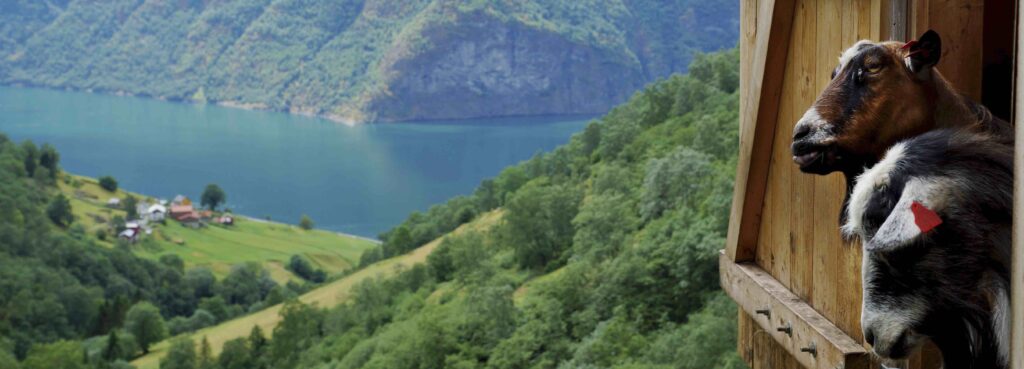[Above: Aurland Fjord from a mountain farm.
Photos by Montag, unless otherwise noted.]
In the time of Covid, small lodges have flirted with failure, even in the fjords of oil-rich Norway. Arild Molstad reports on one couple who – “showing true viking spirit and eco-courage” – believe they can beat the odds by going greener still.
In Aurland, Norway, Good Intentions Contend with Cancellations
Is another annus horribilis on the horizon for tourism? The industry is still gasping for air – and rescue funding – in the wake of Covid-19. It was not only the world’s weakest and most fragile regions that were hit hard. Top destinations, from California and China to Portugal and France, are still reeling from the impact.
Even in the legendary fjords and mountains of affluent Norway – high on many travellers’ bucket lists – a sense of panic has permeated the atmosphere.
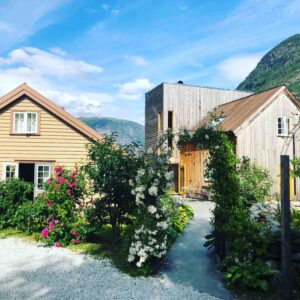
“Just when we were ready to welcome our first guests of the 2020 season, the cancellations came in thick and fast,” says Tone Rønning Vike, who with her husband Bjørn runs the couple’s prize-winning, high-end ecolodge. Called 29|2, after the property number of the farm, the lodge (left) nestles in the spectacular fjord setting of Aurland. The situation was unusually dire for the couple; they had bet their savings, signed a steep mortgage, changed jobs, and moved the entire family to cater to a fast-growing, sophisticated, environmentally engaged international market.
“It is impossible not to get a strong sense of the importance of taking care of nature and culture, but also of the need to nurture a close relationship between the government and local entrepreneurs.”
They had sound reasons to be optimistic. Norway’s tourism engine –“Powered by Nature,” Visit Norway likes to proclaim – was firing on all cylinders, and their National Geographic “geotourism”-inspired approach to holistic conservation was beginning to pay off. Their ecolodge is situated near three world class attractions: the stunning UNESCO World Heritage site Naeroyfjord; the narrow gauge zig-zag train climbing a steep gully from the cruise harbour of Flåm; and the wild, breathtakingly beautiful Aurland mountain trek, also known as “Norway’s Grand Canyon.”
What 8 years ago was a dream, became a reality – and then turned into a nightmare.

For Guests: Small Footprint, Big Impression
“We did everything by the book – consulted the eco-manuals, had our CO2 emissions close to zero, got the price-quality balance spot-on,” explains the couple. “Our clients were enthusiastic, even our dog could smell success! We were looking forward to taking guests on excursions that make a small footprint but leave a huge impression.”
Both Tone and Bjørn strongly believe in supporting the local economy. In restoring the farmhouses, they worked closely with farmers and craftsmen in Aurland and the surrounding valleys. One of the world’s northernmost wine producers has added to the cellar’s ample supply of natural and organic wines.
They have fought hard for restoring the wild fish stock in the Aurland river, once ranked as one of the world’s three leading sea trout rivers by British lords who first made the region famous. As a 29|2 ecolodge guest, you don’t run the risk of being served farmed fish. “It’s not good for the body, or for mother nature,” says Tone.
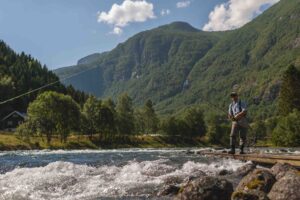
“The 2019 season proved us right,” says Bjørn, a master builder whose expertise with wood is well known in western Norway. Bjørn constructs and restores wooden houses and cabins in some of Norway’s most spectacular valleys and mountains. Being a “wood surgeon,” he has restored old vicarages and 16th-18th century houses. Few know the region better.
The Shutdown
“We were making good money, and had a waiting list for 2020 bookings,” he says. “Then Norway closed its borders – boom!” Tears come to his eyes. “And 98 percent of our guests were foreigners…”
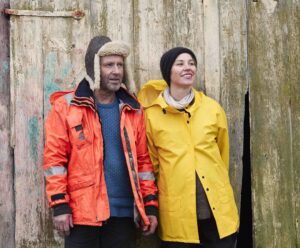
The family had meetings late into the night. How many domestic tourists would arrive and at least compensate for a small part of the strong international revenue flow that was lost in Norway’s short summer season?
Tourism authorities, too, burned the midnight oil. Clearly a massive government injection of funds would be required to prevent a wholesale financial disaster from hitting the fragile fjordland economy. But even in oil-rich Norway not everybody could be bailed out. Compromises had to be made, not only to save those enterprises forming the backbone of the nation’s sustainable tourism industry, but entire towns and villages.
Brighter Prospects
With an emergency bank loan and a generous government hand-out, the couple now hope for brighter prospects in 2021. Crates of vaccine are crossing the border into Norway to meet the needs of the 5.5 million population.
“We would have to say that we are very fortunate to live in a rich country like Norway,” says Tone. “The compensation we have received from the government has eased the situation. We no longer fear we would have to sell the property at great loss. It´s however a fragile security net. We have to make sure we´re not totally dependent on cross-Atlantic visitors. As we are turning towards the Nordic and North European market, I think Norway as a destination should focus more on short-distance travellers, too, instead of Asia, Australia, and the Americas, to reduce CO2 emissions.”
“Norwegian authorities have to understand that our recent dependency on big cruise ships crowding our fjords has to come to an end.”
Wherever you turn in Aurland, you find yourself in a close encounter with nature, but also with the challenges and responsibilities this entails for local tourism entrepreneurs. As in other remote, fragile, and majestic parts of the world, it is impossible not to sense the importance of taking care of nature and culture, but also of the need to nurture a close relationship between government and local entrepreneurs. This is likely to become one of the keystones in Norway’s post-pandemic tourism strategy, to be launched this spring.
After the Virus, Will Norway Get It Right?
“I hope so,” Tone says, “Norwegian authorities have to understand that our recent dependency on big cruise ships crowding our fjords has to come to an end. The signs are good; all polluting cruise ships will be banned from the UNESCO fjords by 2026. And long before that, we have to find a way to generate a tax where visitors are given a chance to co-finance the costs of conserving our precious nature and culture.”
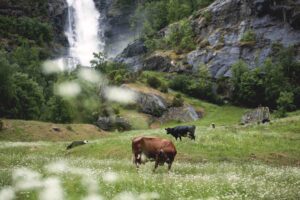
Norway is facing several dilemmas. Its traditional “free access” policy for visitors to explore its natural attractions is increasingly on a collision course with polluting tourism crowds during peak season. Only a relatively a small portion of visitor revenue trickles down to the communities along the fjords. Calls for a tourism tax are gaining support, but is it politically viable, given the corona crisis?


